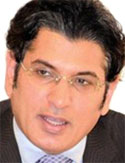20 World Leaders In Six Weeks: What Is Happening In Riyadh?

By Mohammed Fahad al-Harthi
4 March 2015
Riyadh is fast emerging as a central player in developing strategic policies for peace and stability in the region, with obvious benefits for the larger international community, considering the almost daily visits of top foreign government and military leaders over the past few weeks.
It has been abundantly clear for a considerable time now that the region needs a new vision to tackle chronic political conflicts and socio-economic problems. The intense flurry of talks taking place here is a considered attempt to deal with these inadequacies.
US President Barack Obama visited Riyadh on Jan. 27 to offer his condolences on the death of King Abdullah, but political talks took place with the delegation that included several top decision-makers from Capitol Hill.
Custodian of the Two Holy Mosques King Salman and Obama held an important meeting that underlined the two nations’ decades-old alliance and also focused on dealing with the realities of the current situation. It was certainly important for US politicians to get a firsthand briefing on Saudi Arabia’s foreign policy plans.
Closer to home, there have been significant measures to further empower and unify Gulf Cooperation Council (GCC) states and other important regional players. When King Salman assumed the throne, he stressed that he would remain true to the principles of Gulf solidarity first espoused by the founder of the nation.
A key element of this has been the enduring relationship between Saudi Arabia and the UAE. The visit of Sheikh Mohammed bin Zayed, crown prince of Abu Dhabi, confirmed that coordinated action on key policy issues would continue.
Visits by Jordan’s King Abdallah and Palestine President Mahmoud Abbas reaffirmed Saudi Arabia’s role in the region and its commitment to Palestinian sovereignty and statehood.
There has been a concerted effort by the Kingdom to counter the growing threat of terrorism militarily. Last month, Riyadh hosted a meeting of military chiefs of staff from 26 nations, who form part of the international coalition against the so-called Islamic State group.
Equally important, the battle has also been waged for the hearts and minds of people here and abroad. The Kingdom has established an international centre to combat terrorism, to highlight the fact that this is a global menace.
In addition, Saudi Arabia confirmed its support for Egypt in recent talks with Egyptian President Abdel Fattah El-Sissi. The UAE and Kuwait remain key partners in this alliance, which is aimed at political stability in an important part of North Africa.
The most interesting — and deemed the most important — was the visit of Turkish President Recep Tayyip Erdogan. It was an attempt to bridge the gap between the two countries because of Turkey’s support for the Muslim Brotherhood and its position on Egypt’s domestic politics.
The two nations have undoubtedly much in common. King Salman visited Turkey as crown prince in May 2013, which resulted in closer rapport on political issues, and a commitment to trade and mutual economic growth.
South Korean President Park Geun-hye is here for talks focusing on economic and security issues. Long-time ally, Pakistan Premier Nawaz Sharif, is expected today.
The Arab world clearly needs to fortify its own ranks and strike up strategic alliances with other powerful role players such as Turkey. This is crucial because of the continuing meddling by Iran in the internal affairs of several countries in the region including Syria, Iraq and Yemen.
There is every indication now that Riyadh is developing the policy mechanisms to turn these strategic ties into concrete efforts on the ground, which would guarantee regional peace and stability.
Source: http://www.arabnews.com/columns/news/713236




 Moderate Islamist here
Moderate Islamist here


0 comments:
Post a Comment